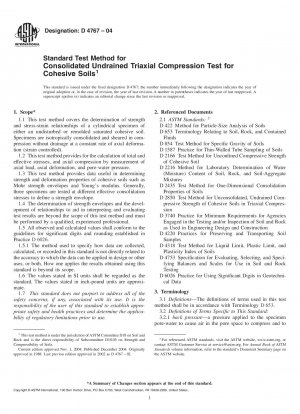ASTM D4767-04
Standard Test Method for Consolidated Undrained Triaxial Compression Test for Cohesive Soils
- Standard No.
- ASTM D4767-04
- Release Date
- 2004
- Published By
- American Society for Testing and Materials (ASTM)
- Status
- Replace By
- ASTM D4767-11
- Latest
- ASTM D4767-11(2020)
- Scope
The shear strength of a saturated soil in triaxial compression depends on the stresses applied, time of consolidation, strain rate, and the stress history experienced by the soil.
In this test method, the shear characteristics are measured under undrained conditions and is applicable to field conditions where soils that have been fully consolidated under one set of stresses are subjected to a change in stress without time for further consolidation to take place (undrained condition), and the field stress conditions are similar to those in the test method.
Note 18212;If the strength is required for the case where the soil is not consolidated during testing prior to shear, refer to Test Method D 2850
or Test Method D 2166 . Using the pore-water pressure measured during the test, the shear strength determined from this test method can be expressed in terms of effective stress. This shear strength may be applied to field conditions where full drainage can occur (drained conditions) or where pore pressures induced by loading can be estimated, and the field stress conditions are similar to those in the test method.
The shear strength determined from the test expressed in terms of total stresses (undrained conditions) or effective stresses (drained conditions) is commonly used in embankment stability analyses, earth pressure calculations, and foundation design.
Note 28212;Notwithstanding the statements on precision and bias contained in this test method. The precision of this test method is dependent on the competence of the personnel performing it and the suitability of the equipment and facilities used. Agencies which meet the criteria of Practice D 3740
are generally considered capable of competent testing. Users of this test method are cautioned that compliance with Practice D 3740 does not ensure reliable testing. Reliable testing depends on several factors; Practice D 3740 provides a means of evaluating some of those factors. 1.1 This test method covers the determination of strength and stress-strain relationships of a cylindrical specimen of either an undisturbed or remolded saturated cohesive soil. Specimens are isotropically consolidated and sheared in compression without drainage at a constant rate of axial deformation (strain controlled).
1.2 This test method provides for the calculation of total and effective stresses, and axial compression by measurement of axial load, axial deformation, and pore-water pressure.
1.3 This test method provides data useful in determining strength and deformation properties of cohesive soils such as Mohr strength envelopes and Young''s modulus. Generally, three specimens are tested at different effective consolidation stresses to define a strength envelope.
1.4 The determination of strength envelopes and the development of relationships to aid in interpreting and evaluating test results are beyond the scope of this test method and must be performed by a qualified, experienced professional.
1.5 All observed and calculated values shall conform to the guidelines for significant digits and rounding established in Practice D 6026.
1.5.1 The method used to specify how data are collected, calculated, or recorded in this standard is not directly related to the accuracy to which the data can be applied in design or other uses, or both. How one applies the results obtained using this standard is beyond its scope.
1.6 The values stated in SI units shall be regarded as the standard. The values stated in inch-pound units are approximate.
1.7 This standard does not purport to address all of the safety concerns, if any, associated with its use. It ......
ASTM D4767-04 Referenced Document
- ASTM D1587 Standard Practice for Thin-Walled Tube Sampling of Soils for Geotechnical Purposes*, 2024-04-19 Update
- ASTM D2166 Standard Test Method for Unconfined Compressive Strength of Cohesive Soil*, 2024-04-19 Update
- ASTM D2216 Standard Test Method for Laboratory Determination of Water (Moisture) Content of Soil and Rock by Mass
- ASTM D2435 Standard Test Method for One-Dimensional Consolidation Properties of Soils
- ASTM D2850 Standard Test Method for Unconsolidated-Undrained Triaxial CompressionTest on Cohesive Soils
- ASTM D3740 Standard Practice for Minimum Requirements for Agencies Engaged in the Testing and/or Inspection of Soil and Rock as Used in Engineering Design and Construction
- ASTM D422 Standard Test Method for Particle-Size Analysis of Soils
- ASTM D4220 Standard Practices for Preserving and Transporting Soil Samples
- ASTM D4318 Standard Test Methods for Liquid Limit, Plastic Limit, and Plasticity Index of Soils
- ASTM D4753 Standard Specification for Evaluating, Selecting, and Specifying Balances and Scales for Use in Soil, Rock, and Construction Materials Testing
- ASTM D6026 Standard Practice for Using Significant Digits in Geotechnical Data
- ASTM D653 Standard Terminology Relating to Soil, Rock, and Contained Fluids
- ASTM D854 Standard Test Methods for Specific Gravity of Soil Solids by the Water Displacement Method
ASTM D4767-04 history
- 2020 ASTM D4767-11(2020) Standard Test Method for Consolidated Undrained Triaxial Compression Test for Cohesive Soils
- 2011 ASTM D4767-11 Standard Test Method for Consolidated Undrained Triaxial Compression Test for Cohesive Soils
- 2004 ASTM D4767-04 Standard Test Method for Consolidated Undrained Triaxial Compression Test for Cohesive Soils
- 2002 ASTM D4767-02 Standard Test Method for Consolidated Undrained Triaxial Compression Test for Cohesive Soils
- 1995 ASTM D4767-95 Standard Test Method for Consolidated Undrained Triaxial Compression Test for Cohesive Soils
